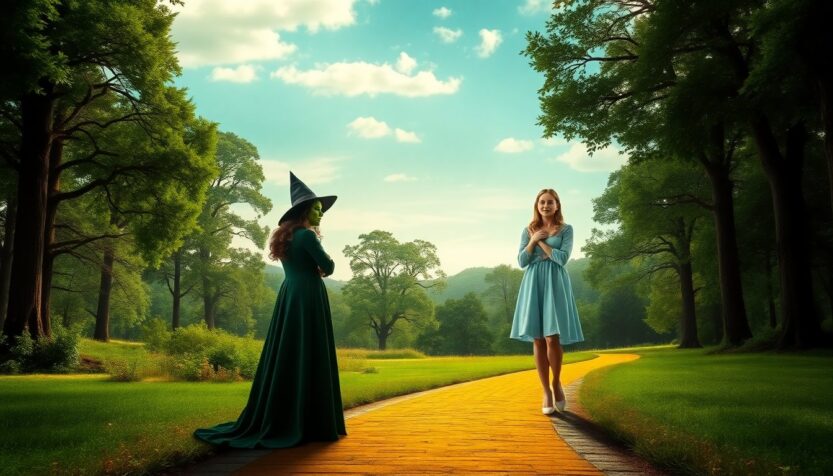The film wicked: for good, featuring Cynthia Erivo and Ariana Grande as the iconic witches Elphaba and Glinda, takes a distinctive approach to storytelling. While maintaining a strong connection to the original Broadway musical, it diverges in several key areas, particularly in the development of Glinda’s character. This article explores the changes and new themes introduced in the film adaptation, discussed in detail by the creative team during an official podcast.
In the first part of the film series, audiences witness Elphaba’s transformation from a student at Shiz University to the notorious Wicked Witch of the West. However, wicked: for good shifts its focus, placing Glinda’s development at the forefront. This sequel not only continues Elphaba’s story but also portrays Glinda’s evolution from a mere spokesperson for the Wizard to a formidable witch in her own right. These narrative choices emphasize the importance of female empowerment and friendship in the face of adversity.
Character development and new themes
One notable addition to the film is a flashback featuring a young Glinda, portrayed by Scarlett Spears. This scene occurs during Glinda’s birthday party, where she attempts to convince her friends of her magical abilities, paralleling a moment in the first part of the story where a young Elphaba discovers her own powers. Such moments serve as poignant reminders of their respective journeys and the challenges each character faces.
Musical innovations
The film introduces new musical elements that enhance the narrative. For instance, Erivo’s Elphaba performs a powerful new ballad titled no place like home, which underscores her commitment to Oz. Conversely, Grande’s Glinda is given the emotional eleven o’clock number the girl in the bubble. In this song, she grapples with her role in the pursuit of Elphaba and ultimately resolves to embrace her identity as Glinda the Good.
As the story unfolds, the tension between the two witches escalates, culminating in a dramatic reconnection in the film’s climax. Their duet of the titular song, for good, evokes a sense of reconciliation. Interestingly, while the stage production concludes shortly after this number, the film extends the narrative, allowing both characters to achieve their aspirations by the end.
Confrontation and resolution
The film retains key elements from the original musical, including Glinda’s confrontation with the Wizard, played by Jeff Goldblum, and Madame Morrible, portrayed by Michelle Yeoh. However, it adds a compelling twist: Glinda reveals Elphaba’s true lineage, disclosing that she is the Wizard’s daughter. This revelation alters the dynamic between the characters and emphasizes the themes of identity and sacrifice.
Closure of story arcs
In a refreshing conclusion, Glinda takes charge of the narrative surrounding the persecuted talking animals in Oz. She urges the citizens to welcome back the exiled creatures, illustrating her growth and commitment to justice. This resolution is notably absent from the original stage version, making the film’s ending more satisfying. The audience witnesses Elphaba’s sacrifice come full circle, affirming that her efforts were not in vain.
Furthermore, the film pays homage to beloved characters from the original story. For instance, Dr. Dillamond, Elphaba’s cherished professor, returns to his classroom, signifying continuity and hope for the future of Oz.
The film concludes with a visually stunning scene of Glinda standing in the spot where Elphaba once defied gravity, holding the magical book the grimmerie. As the story wraps up, Glinda’s newfound abilities are showcased, symbolizing her journey toward empowerment. The final moments resonate with optimism, contrasting sharply with the darker ending of Gregory Maguire’s original novel.
In its last shot, the film revisits a nostalgic moment from the musical, depicting Elphaba and Glinda alongside their friends in a tulip field at Shiz University. This touching scene serves as a reminder of their bond and the journey they have traversed together. The subtle nod to the original poster, with Glinda whispering a secret to Elphaba, encapsulates the essence of their friendship and the film’s overarching themes of love and redemption.
